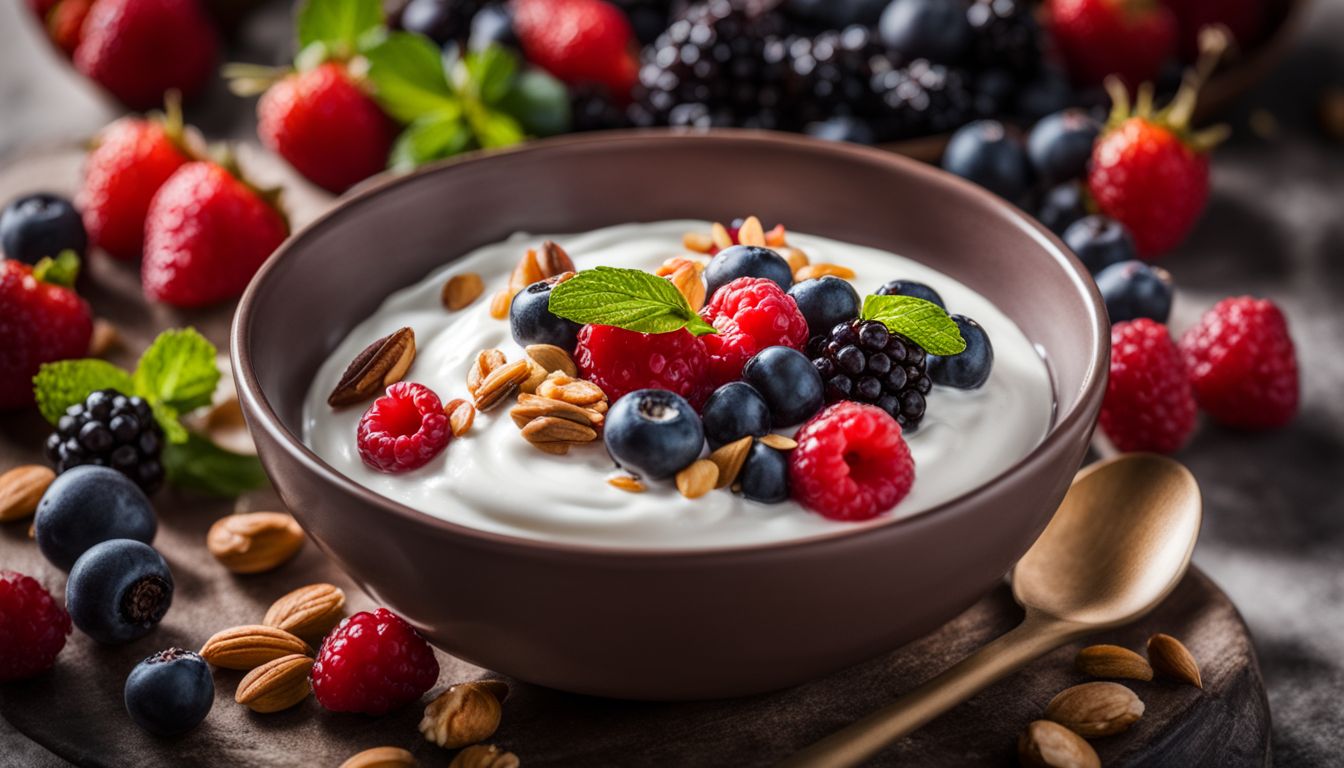Protein Greek Yogurt: A Nutrient Powerhouse For A Balanced Diet

Are you struggling to find a nutritious food that supports your balanced diet regime? The answer might just be Greek yogurt, packed with an impressive amount of protein per serving.
This blog post will dive into the many benefits of this dairy powerhouse, from its rich nutrient profile to its role in maintaining optimal health. Ready for a deep-dive into the world of Greek Yogurt?.
Key Takeaways
- Greek yogurt is a thick and creamy dairy product with a higher protein content compared to regular yogurt, making it an excellent high-protein food choice.
- Greek yogurt is packed with essential nutrients like calcium and selenium, which promote bone health and overall wellbeing.
- Including Greek yogurt in your diet can aid in weight management, support cell growth and muscle repair, and provide numerous other health advantages.
What Is Greek Yogurt?

Greek yogurt is a thick and creamy type of yogurt that has been strained to remove most of the whey, resulting in a higher protein content compared to regular yogurt.
Definition
Greek yogurt is a thick, creamy dairy product made by straining regular yogurt to remove the whey. This process not only gives it a unique texture but also boosts its nutritional value significantly.
Packing up to 20 grams protein per serving compared to traditional yogurt’s mere 5 grams, Greek yogurt stands as an excellent high-protein food choice. It offers other essential nutrients too like calcium and selenium, making it beneficial for bone health and overall wellbeing.
With low carbohydrate content, Greek yogurt aids in weight management while satisfying hunger effectively. Moreover, it supports cell growth and muscle repair due to its rich protein composition.
Therefore, including this nutrient powerhouse in your diet could lead to numerous health advantages.
Nutritional information

Greek yogurt is a nutrient-rich food, offering a variety of essential nutrients in one serving. Here’s a comprehensive breakdown of its nutritional content.
| Nutrient | Amount Per Serving (200g) |
|---|---|
| Protein | 20g |
| Calcium | 200mg |
| Carbohydrates | 8g |
| Selenium | 45% of Daily Value |
| Fat | Varies by brand and fat content; typically low |
| Sugars | Varies by brand; typically low unless artificially sweetened |
This powerhouse provides considerably more protein compared to traditional yogurt, contributing to its reputation as a key food for balanced diets. From fostering muscle growth to supporting bone health with rich calcium content, Greek yogurt has it all. It’s also a boon for those watching their carb intake, with just about 8 grams per serving. The added benefit of selenium enriches its nutritional profile, offering about 45% of the daily value. Remember to select brands with low fats and sugars to maximize the health benefits.
Protein Content in Greek Yogurt

Greek yogurt is known for its high protein content, making it a valuable addition to a balanced diet.
Importance of protein in a balanced diet

Protein plays a crucial role in maintaining a balanced diet. This macronutrient helps reduce hunger and boosts metabolism, aiding in overall weight management. A Greek yogurt serving provides up to 20 grams of protein, making it an excellent source for this nutrient.
Energy production and muscle building require protein, which is found abundantly in Greek Yogurt. The high-protein content fuels body cells for growth and tissue repair. Another advantage Greek yogurt holds over traditional options is its low carbohydrate content with only about 8 grams per serving, contributing to fewer spikes in blood sugar levels post consumption.
Comparison to regular yogurt

Greek yogurt offers a myriad of health benefits and makes an excellent addition to a balanced diet. Compared to regular yogurt, it stands out because of its higher protein content, lower carbohydrate content, and rich nutrient profile. Here is a concise comparison to highlight the differences:
| Greek Yogurt | Regular Yogurt | |
|---|---|---|
| Protein Content | Greek yogurt contains around 20 grams of protein per serving, contributing to muscle building and cell growth. | Regular yogurt may only have 5 grams of protein per container. |
| Carbohydrate Content | Greek yogurt is low in carbohydrates with around 8 grams per serving. | Regular yogurt often contains more carbohydrates. |
| Nutrient Profile | It provides an excellent source of calcium, important for bone health. Also, Greek yogurt is a good source of selenium, providing about 45% of the daily value in a single serving. | Regular yogurt also contains calcium and selenium, but usually in lesser amounts. |
| Texture and Taste | Due to the straining process, Greek yogurt has a thicker texture and a tangier taste compared to regular yogurt. | Regular yogurt has a thinner consistency and a milder flavor. |
In summary, Greek yogurt’s high protein content, low carbohydrate count, and rich nutrient profile make it a healthier choice over regular yogurt. Making it a staple in your diet can contribute greatly to maintaining a balanced and nutritious diet.
Health Benefits of Greek Yogurt

Greek yogurt offers numerous health benefits due to its high protein content and other essential nutrients. It is a valuable addition to a balanced diet, promoting muscle-building, bone health, stable blood sugar levels, and a healthy gut.
Muscle-building protein

Greek yogurt is a powerhouse of muscle-building protein. With around 20 grams of protein per serving, it provides the necessary fuel for cell growth, muscle building, and tissue repair.
The straining process used to make Greek yogurt gives it a thicker texture and higher protein content compared to regular yogurt. This makes it an excellent choice for athletes or anyone looking to enhance their fitness goals.
By incorporating Greek yogurt into your diet, you can ensure that you’re getting the essential amino acids needed to support muscle development and overall strength.
Calcium for bone health

Greek yogurt is not only a great source of protein, but it also provides an important nutrient for bone health: calcium. Calcium plays a crucial role in maintaining strong bones and teeth.
Including Greek yogurt in your diet can help ensure that you get enough calcium to support healthy bones. Just one serving of Greek yogurt contains approximately 20% of the recommended daily intake of calcium.
So, by enjoying some protein-rich Greek yogurt, you’re not only fueling your body with muscle-building nutrients but also supporting the health and strength of your bones.
Stabilizing blood sugar

Greek yogurt can play a role in stabilizing blood sugar levels. With its high protein content, Greek yogurt helps slow down the digestion process and the release of glucose into the bloodstream.
This can prevent spikes in blood sugar levels, providing a steady source of energy throughout the day. Additionally, Greek yogurt has a lower glycemic index compared to other carbohydrate-rich foods, which means it has less of an impact on blood sugar levels.
Incorporating Greek yogurt into your diet can be beneficial for those managing diabetes or looking to maintain stable blood sugar levels.
Probiotics for gut health

Greek yogurt is not only high in protein but also contains probiotics that are beneficial for gut health. Probiotics are live bacteria and yeasts that promote a healthy balance of microorganisms in the digestive system.
These helpful bacteria can improve digestion, boost the immune system, and reduce inflammation in the gut. Including Greek yogurt in your diet can help maintain a healthy gut flora and support overall digestive health.
How to Incorporate Greek Yogurt into Your Diet

There are countless ways to add Greek yogurt to your daily meals and snacks. From using it as a base for smoothies and parfaits, to incorporating it into baked goods or savory dishes, the options are endless.
Discover delicious recipes and meal ideas that will help you reap the benefits of this nutrient-packed powerhouse. Start incorporating Greek yogurt into your diet today!
Recipes and meal ideas

Greek yogurt is a versatile ingredient that can be used in a variety of recipes to add a boost of protein to your meals. Here are some delicious and nutritious ideas for incorporating Greek yogurt into your diet:
- Smoothies: Blend Greek yogurt with your favorite fruits, such as berries or bananas, along with some spinach or kale for added nutrients.
- Parfaits: Layer Greek yogurt with granola and mixed berries for a tasty and filling breakfast or snack.
- Salad dressing: Mix Greek yogurt with herbs, lemon juice, and garlic to make a creamy and healthier alternative to traditional salad dressings.
- Dips: Use Greek yogurt as a base for dips like tzatziki or buffalo chicken dip by adding herbs, spices, and your choice of ingredients.
- Baked goods: Replace butter or oil with Greek yogurt in recipes for muffins, pancakes, and cookies to reduce the fat content while maintaining moisture.
- Overnight oats: Combine Greek yogurt with rolled oats, milk, chia seeds, and your choice of toppings like fruit or nuts for an easy grab-and-go breakfast option.
- Savory sauces: Make a creamy pasta sauce by mixing Greek yogurt with garlic, Parmesan cheese, and lemon juice.
- Frozen treats: Freeze Greek yogurt mixed with fruit puree or blended smoothie ingredients in popsicle molds for a healthy dessert option.
Choosing the right brand

When selecting Greek yogurt, it’s important to choose the right brand. Look for brands that use high-quality ingredients and minimal additives. Check the label for information on protein content, as this can vary between different brands.
Additionally, opt for Greek yogurts that are low in added sugars and artificial sweeteners to ensure you’re getting a nutritious option. Reading reviews or seeking recommendations can also help guide your decision-making process when choosing the right brand of Greek yogurt for your balanced diet.
Avoiding added sugars and artificial sweeteners

Greek yogurt is already a nutritious choice on its own, but it’s important to be mindful of added sugars and artificial sweeteners when selecting your Greek yogurt. Many flavored varieties can have high amounts of added sugars, which can contribute to weight gain and increase the risk of chronic diseases like diabetes.
Opting for plain Greek yogurt and adding your favorite natural sweeteners, such as fresh fruits or a drizzle of honey, allows you to control the sweetness while avoiding unnecessary additives.
By choosing plain Greek yogurt without added sugars or artificial sweeteners, you can enjoy all the benefits of this protein powerhouse without compromising your health goals.
Conclusion

Greek yogurt is a nutrient powerhouse that can greatly benefit your balanced diet. With its high protein content, it helps build muscle and promote satiety. Additionally, Greek yogurt provides important nutrients like calcium and selenium.
Including Greek yogurt in your daily meals is an easy and delicious way to boost your protein intake and support overall health. So grab a spoonful of this protein-packed treat and enjoy the benefits it has to offer!
FAQs
1. What is Greek yogurt protein and why it’s important?
Greek yogurt protein is a nutrient-rich, creamy food that can fuel your body with essential proteins needed for a balanced diet.
2. How much protein does Greek yogurt have?
The amount of protein in greek yogurt varies based on brand and serving size but typically, one cup contains between 15g to 20g of protein.
3. Can Greek Yogurt be used in Protein shakes?
Yes! By blending the high-protein Greek yogurt with fruits or other flavors, you can easily make Greek Yogurt Protein Shakes which are deliciously nutritious.
4. Does mixing Protein powder with greek yogurt increase its nutritional value?
Absolutely! You can fortify the amount of protein per serving by adding your favorite flavor of protein powder to nonfat or low-fat greek yogurts.
5. Are there any creative uses for greek yogurt in recipes?
Indeed! From creating tasty snacks like nonfat greek yogurt muffins & pancakes to desserts such as ice creams or smoothies; it brings a wonderful creamy texture along with its high-protein content!
6. Is Chobani’s version a good source of this nutrient powerhouse?
Chobani’s plain variety contributes well towards meeting daily dietary needs boasting around 22 grams of Protein per each cup served!
Sources referenced in this article
- https://www.medicalnewstoday.com/articles/323169
- https://www.healthline.com/nutrition/benefits-of-yogurt
- https://www.eatingwell.com/article/8015607/greek-yogurt-benefits/
- https://draxe.com/nutrition/greek-yogurt-nutrition/
- https://www.yogurtinnutrition.com/8-ways-greek-yogurt-benefits-health/
- https://www.shape.com/healthy-eating/meal-ideas/many-benefits-greek-yogurt
- https://webmedy.com/blog/benefits-greek-yogurt/

Author
Years ago, the spark of my life’s passion ignited in my mind the moment I stepped into the local gym for the first time. The inaugural bead of perspiration, the initial endeavor, the very first surge of endorphins, and a sense of pride that washed over me post-workout marked the beginning of my deep-seated interest in strength sports, fitness, and sports nutrition. This very curiosity blossomed rapidly into a profound fascination, propelling me to earn a Master’s degree in Physical Education from the Academy of Physical Education in Krakow, followed by a Sports Manager diploma from the Jagiellonian University. My journey of growth led me to gain more specialized qualifications, such as being a certified personal trainer with a focus on sports dietetics, a lifeguard, and an instructor for wellness and corrective gymnastics. Theoretical knowledge paired seamlessly with practical experience, reinforcing my belief that the transformation of individuals under my guidance was also a reflection of my personal growth. This belief holds true even today. Each day, I strive to push the boundaries and explore new realms. These realms gently elevate me to greater heights. The unique combination of passion for my field and the continuous quest for growth fuels my drive to break new ground.















